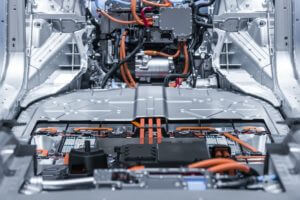Future of the lithium-ion battery
 |
Special to The Auto Channel
From LMC-Auto
January 2, 2019; For the foreseeable future, the success of battery electric vehicles (BEV) heavily relies on improvements being made to lithium-ion technology. Consumers are demanding longer driving range and lower costs if they are to make the switch to electric driving. In the near term, the capacity of lithium-ion batteries will continue to increase by around 7% annually, being driven by advances in anode and cathode materials, and, to a lesser extent, by battery pack design and control. These carry their own challenges, but there is confidence within the research community that gains will be realised.
“In the near term, the capacity of lithium-ion batteries will continue to increase by around 7% annually”
Most of the recent advances in lithium-ion energy density have come from manipulating the relative quantities of materials such as cobalt, manganese, nickel and aluminium in cathodes. However, the technical merits are not the only factor dictating material selection. Currently, almost 80% of sales of BEV batteries use cobalt to some extent, but the majority of global cobalt reserves are mined in unstable regions with unscrupulous working conditions. Therefore, availability and ethical-political concerns also play a part. Several manufacturers are attempting to completely phase out cobalt.
The near-term advances are expected to plateau around 2025 as any further improvements yield increasingly smaller gains. After this, we expect a major breakthrough to be made in battery cost and performance, as manufacturers move beyond the conventional lithium-ion by commercialising promising technologies such as solid state electrolytes.
“We expect a major breakthrough to be made in battery cost and performance as manufacturers move beyond the conventional lithium-ion by commercialising promising technologies”
Current lithium-ion batteries exhibit around 150 Wh/kg in specific energy, 3 kW/kg in specific power, with a wholesale battery pack cost of around $200/kWh. There are current claims of battery cell price per kWh as low as $113, but this figure does not include the cost of the battery pack. While pack price has dropped significantly over the last decade, future gains will be harder to find and we don’t expect a pack price figure of $100/kWh, giving cost parity with internal combustion engines, before the middle of the next decade. Even at this stage, batteries will still be compromised by range and charging-time limitations. For that to change, a technology breakthrough, such as solid state, would be required. Naturally, there is a risk that this assumed breakthrough will not come to fruition. If that is true, it may be the catalyst for the move to hydrogen fuel cells, widely recognised as the most sustainable powertrain solution.
If you are interested in hearing more about the future of batteries and the evolution of electrification register now for our webinar with Al Bedwell, Director, Global Powertrain Forecast, on Thursday 24 January 2019 at 3pm GMT.



